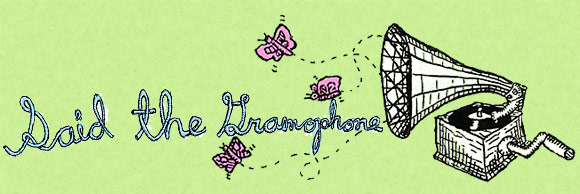In "The Kugelmass Episode", a short story by Woody Allen, the magician/entertainer The Great Persky transports Professor Kugelmass into the novel Madame Bovary. This is arranged at K.'s behest, because he is in a loveless second marriage, and is in the midst of a midlife crisis. He needs something, he thinks. Perhaps an affair with Flaubert's wanton cuckolder would do the trick, he thinks. So, K. and B. start doing it, and it's great - I mean, who among us can honestly say that we've never fantasized about 19th Century French Literary ACTION? But then things start to deteriorate: B. begins to feel guilty and K. becomes exceedingly anxious about his other man status. The situation eventually becomes unworkable when Professor Kopkind, K.'s colleague, rereads Madame Bovary, and notices a new character whom he immediately recognizes as Kugelmass.
The certainty with which Professor Kopkind makes his identification is hysterical. Kopkind had always been jealous of Kugelmass, and seeing him infiltrate this great novel was simply too much. Allen's conceit is a standard post-modern gimmick, but it's the way he uses it to illuminate the petty insecurities and rivalries among lovers and colleagues that sets it apart from similar stories and makes it so deeply funny. Kopkind is so overcome by jealousy and anger that he doesn't even stop to consider the absurdity and the impossible logistics of the situation.
Similarly, in Borges's "Pierre Menard, Author of the Quixote," it's not the project itself (a French poet, Pierre Menard, sets out to rewrite Don Quixote, word-for-word as Cervantes had done, but through his own creativity) that leaves you rolling around in an apoplectic fit of laughter, but the narrator's assertion that Menard's text (I reiterate, verbally identical to Cervantes') is "infinitely richer".
In both cases, a funny premise becomes exponentially funnier (its funniness is cubed) because a character outside of the absurd conceit treats the premise as if it's perfectly normal. And more than that, they treat the premise the same way we would if we were to believe it to be normal. That is, these situations, when peripheral characters corroborate their normalcy or everydayness, are given a kind of internal coherence in which the actors can be judged against an internal logic, not like our own. Something human is maintained and cast in the light of a very different world, so that we may see ourselves differently, from a different perspective.
I know, BLAH BLAH BLAH. I'm getting to it.
Dan Beirne and Wittgenstein say "fuck possible worlds", but Swan Lake want to do no such thing. They create a world in sound that is a negative of our own. This is Spencer Krug's fiction, but it's treated as real by Bejar and Mercer. And that's what makes it so bleak and cold. The noises they make are unfamiliar: their voices are not human, their guitars not human, their bodies, the space that they fill... yet, in its shadows and blackness, in what is left unsaid and unlit, we can sense something human in "All Fires". It is us lurking in the corners, us emerging in the penumbra.
Swan Lake shows us a claustrophobic but high-ceilinged room (everything's soaked in reverb), unknown creatures crawling (the panning trill of treble-free guitars), and a Heraclitus-like refrain ("All fires have to burn alive to live") that if anyone said to you, you'd probably start crying. What they don't explicitly show us is that they're in it together - the three of them understanding and taking as normal what we cannot. [Hold your breath til November]
***
Are you lonely? Don't be. You have a friend in tape hiss, in the background creak of wooden chairs, in the crackle and click of four-track recordings. And besides, I'm coming over later tonight, and I'm bringing S1C3R1A1B3B3L1E1 and mojitos. [Info]
Posted by Jordan at August 4, 2006 2:37 PMWhile lots of sites rushed to get thier swan lake posts out, this is the best one i've seen. I didn't think about the song this much until I read this.
Posted by Patrick at August 4, 2006 3:09 PMAnd there you have it, Patrick: the perfect analogy for music/the internet/mp3 blogs in general.
Posted by Ryan Catbird at August 4, 2006 3:21 PMWow. Fantastic write up Jordan! I actually heard a reading of "The Kugelmass Episode" on the radio a few years back without knowing what it was, yet, found it hilarious. Especially the ending!
Also, I really agree with Patrick about this being one of the best Swan Lake posts.
Posted by Dylan at August 4, 2006 8:15 PMGood post... However, i'll offer a disagreeance: I'd say that high-ceiling'd room you speak of, alluding to the song's reverb, is actually uncomfortably tight. There's nothing very uncalculated here, and reverb wouldn't be possible in such a place... it would be an echo, of which this song has none. A reverb, however, is just short of an echo, a buzz of countinual impossibilty, sitting on the brink of busting the song wide open....which i'm waiting for but I'm not hearing.
I like the Borges analogy, although I would have used a different story (most likely A Secret Miracle) to show your point.
Posted by Connor at August 4, 2006 10:08 PMI had passed up "All Fires" when I saw it showing up on other mp3 blogs, but after reading your write up for it I decided to give it a chance. And now all I can say is "wow".
Thank you.
Posted by Jibril at August 5, 2006 1:12 AMmore of the same from krug. is it required that every single blog post this track?
meh
Is that a deliberate typo in the first sentence? Because someone messing around with Madame Bovary by inserting new characters in it clearly would be an enter-tainter.
Posted by Jeff at August 5, 2006 10:49 PMDid Wittgenstein say that verbatim?
Posted by Grace at August 7, 2006 4:40 AMJeff - Haha. I fixed it, but reluctantly.
Grace - Probably. How am I supposed to know?!
Posted by Jordan at August 7, 2006 4:32 PMI am pretty sure Voltaire said it. Wittgenstein, I'm not so sure about.
Posted by Grace at August 8, 2006 4:59 AMOK, Grace, you forced me to break open my Bartlett's...
Wittgenstein said "Fuck possible worlds without shared objects."
Leibniz said "This is the best of all fucking possible worlds."
Voltaire said "Fuck Leibniz."
is that digital static sound supposed to be on the beginning of this swan lake song?
Posted by marin at August 10, 2006 3:36 PMGo to my blog fo another Swan Lake song
http://snakesgotablog.blogspot.com/




